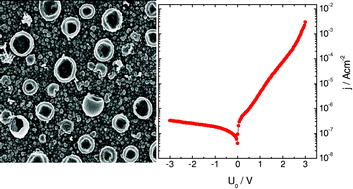Surface modified high rectification organic diode based on sulfonated poly(aniline)
Abstract
In this paper, we present a new method that combines surface modification of indium-tin oxide (ITO) and electropolymerization to prepare thin, sulfonated poly(aniline) (SPAN) films with good surface coverage. The surface modification enhances the growth of the SPAN film resulting in a better rectification signal than for SPAN films polymerized on unmodified ITO substrates. The films were characterized by FTIR, scanning electron microscopy (SEM) and atomic force microscopy (AFM). The sulfonation degree of SPAN was determined to 29% by X-ray photoelectron spectroscopy (XPS). UV-VIS spectroscopy shows that the pH sensitivity of SPAN is suppressed due to sulfonation of the polymer backbone. It is also shown that conversion of the SPAN film to the emeraldine salt (ES) form after polymerization is crucial for obtaining a high rectification signal. This is an important practical aspect in the preparation procedure of organic electronic devices.


 Please wait while we load your content...
Please wait while we load your content...